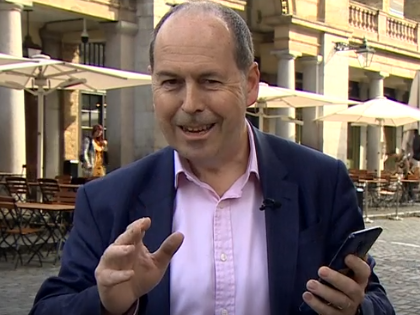
BBC technology correspondent Rory Cellan-Jones announced he has been diagnosed with Parkinson’s disease after viewers noticed his hand shaking during a live broadcast.
Cellan-Jones, who has worked at the broadcaster for more than 20 years, said he decided to reveal the diagnosis, made in January, after viewers began contacting the BBC to suggest he should see a doctor.
He made the announcement on Twitter after completing his first live broadcast using a 5G mobile connection for BBC Breakfast yesterday (see video below).
He tweeted: “A couple of people have noticed my hand shaking in my live 5G broadcast today. So seems a good time to reveal that I’ve recently been diagnosed with Parkinson’s.
“I’m getting good treatment and the symptoms are mild right now – so I’m carrying on as normal. Onwards and upwards.”
Parkinson’s disease is an incurable condition in which parts of the brain become progressively damaged. The three main symptoms are tremors, stiffness and slowness of movement. Boxing legend Muhammad Ali, who died in 2016, is perhaps the disease’s most famous sufferer.
Speaking on BBC 5 Live this morning, Cellan-Jones said he had gone to see his GP after noticing a few changes over the past year, including a tremor in his right hand like the one noticeable on yesterday’s live broadcast.
He had also been dragging his foot while running and noticed stiffness in opening and closing his hand after filming a story about artificial intelligence used to detect Parkinson’s in which that was the main test.
The diagnosis therefore “wasn’t a huge shock”, he said.
“I’m pretty positive, most of my symptoms are mild at the moment,” Cellan-Jones told 5 Live.
“People notice me slightly limping and they notice this tremor, but apart from that… I’ve always been a rubbish typist and that has got worse. Those are the only things that are affecting me at the moment.
“I’m trying to keep fit, I’ve taken up pilates, something I thought I’d never do, baking a lot of bread, another good piece of therapy, so trying to keep positive.”
The journalist said he decided to go public with his diagnosis after speaking to his producer, who was among the colleagues and viewers to have noticed him shaking on air.
“I just put it out there really wanting to be upfront about it because some people were worried, a couple of people had actually contacted the BBC and suggested I should see a doctor and I’d already done that and I wanted to be frank about it.”
Cellan-Jones, who has an elderly relative with the disease, said he is currently on medication and has taken part in a research project looking at whether there is a genetic explanation for the disease.
“I know it can be slowed by drugs,” he said. “I’m on some medication, not having much of an effect at the moment, but I’m also hopeful that there’s a lot of research going on in this area and they’re going to find better ways of dealing with it so I’m just trying to keep positive about that.”
His announcement on Twitter launched an outpouring of support.
BBC News presenter Simon McCoy wrote: “It’s funny when you work with people almost every day. They become friends without befriending you. They become important without ever realising it.
“At moments like this, Rory, you need to know that’s how many of your colleagues feel. I know I do. Good luck – we are here..”
Cellan-Jones said he was “very moved” by the “lovely messages”, adding that they “show that Twitter can still be a very kind place”.
Picture: BBC
Email pged@pressgazette.co.uk to point out mistakes, provide story tips or send in a letter for publication on our "Letters Page" blog
